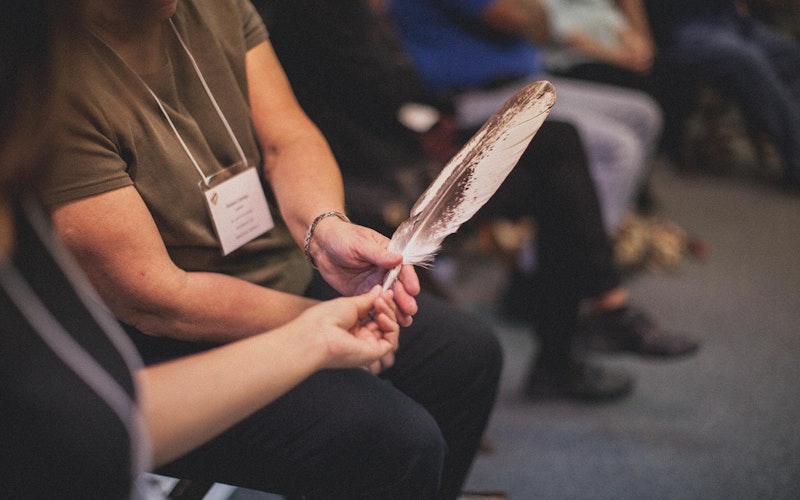
Culture At Large
Watching the Washington Redskins during Native American Heritage Month
Football has been on my mind recently, as the debate over the Washington Redskins name rages on. California recently became the first state to ban the use of the “R-word” for public school mascots, while earlier this year a federal judge upheld a decision to cancel six trademarks held by the NFL team because they “may disparage” Native Americans.
I understand that the team’s branding has a long history, to which many fans feel an emotional connection. (I might respond quite strongly to a name change for the Montreal Canadiens.) But there are people for whom that name does not conjure memories of Super Bowls won. Instead, it may remind them of the Trail of Tears or other forced relocations, in which Native Americans were marched many miles and thousands died en route. Or it may remind them of grandparents or parents who were taken from their families to attend church-run residential schools, which were meant to divorce the children from their “uncivilized” cultures. Or the chronic drinking water issues on reserves in both the United States and Canada. Or the high rates of police shootings of Native Americans, which are almost the same as that of African Americans. The Redskins debate happens in this context.
The debate also illustrates the gap that still exists between Indigenous peoples and other North Americans. We don’t know our shared history. We tell pretty stories about Native Americans welcoming pilgrims or exciting stories about cowboys and "Indians.” We often imagine Native peoples as mostly disappeared or blame them for the alcoholism and poverty that so often plague their communities. We also do not tend to recognize the contributions that Native Americans and First Nations make to our societies. The history we tell is incomplete, one-sided. We miss out on so much richness in this relationship because we don't really know our Indigenous neighbors.
That began to change for me four years ago when I first experienced the Blanket Exercise. This interactive exercise literally walks participants through the history of the relationship between Indigenous and non-Indigenous peoples in North America. (Both Canadian and American versions are available.) Blankets are spread out on the floor to represent North America before colonization, and participants — representing Indigenous peoples — mill about on the blankets, free to move and practice their cultures on their territories. As a narrator reads the history, however, the blankets are folded up, until participants are barely balancing on isolated blankets. Many participants are directed to leave the blankets during the exercise to represent the huge numbers of Indigenous people who died of war, starvation, diseases and the like.
We don’t know our shared history.
It can be a deeply transformative experience for both descendants of immigrants like me and Indigenous people. My friend and colleague Shannon Perez, a Sayisi Dene woman from Winnipeg, recalled her experience of being “relocated” during the exercise. “This is significant because my mom was the first generation from her community to grow up in a community that had been relocated by the Canadian government, with devastating results. No one knew this information about me or my family beforehand. As I was sitting on a blanket alone, I had a glimpse of what it might have felt like for my mom and her family to be living in a foreign territory.”
The Holy Spirit was at work in Shannon’s experience. The “coincidence” of the facilitator choosing her, not another person, to re-enact the very piece of history that had most deeply touched her own family is no coincidence at all. It is an example of the mysterious, beyond-us power of the Gospel — despite the fact that those who preached it in North America often also believed that Indigenous peoples were somehow lesser children of God than Europeans or their descendants.
In Shannon’s experience, I see the Holy Spirit's power to move and cultivate reconciliation — sometimes through us, but sometimes despite us. This is not a tidy story of the Church as agent of restoration. Rather, it's a story of God being bigger than the Church and yet calling His church, mercifully, to repent and join in the work of reconciliation that He's already doing. As Anglican Indigenous Bishop Mark MacDonald, a Mi’kmaq theologian, writes, “Though largely ignored and rarely understood, there have been many examples of Gospel fruitfulness with a unique prophetic capacity among the People of the Land after the arrival of the missionaries and, quite often, without their support or involvement. We see here the Gospel’s stubborn refusal to become the servant of one culture’s attempt to subvert another.”
This Native American Heritage Month, as we find ourselves in the midst of another football season, let’s learn our neighbors’ stories. Let’s fully understand the opposition to the Redskins brand. May that mysterious Spirit lead us on.
Topics: Culture At Large, News & Politics, History, Justice, North America